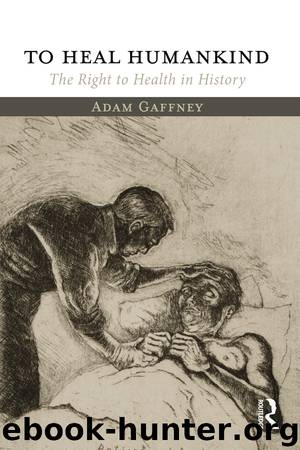To Heal Humankind by Gaffney Adam;

Author:Gaffney, Adam;
Language: eng
Format: epub
Publisher: Routledge
6
Postwar
Health and Death in the Cold War
Nestled in the foothills of the stunning Trans-Ili Alatau mountain range, Alma-Ata—the capital of the Kazakh Soviet Socialist Republic—had some practical advantages as the host city of an international conference on health. For one, it was home to the Lenin Convention Center, which housed a capacious 3,000-seat auditorium. Nor were accommodations in the city an issue: in order to house delegates from the 134 nations in attendance, the Soviets rapidly erected a hotel with a thousand beds. And although the auditorium’s audio system lacked (in the Soviet fashion) the capacity for audience participation, this was easily fixed by some re-rigging performed by a company from Italy.1
Ultimately, the Soviet Union had its wish, and in September 1978, the week-long “International Conference on Primary Healthcare,” jointly sponsored by the WHO and the United Nations Children’s Fund (UNICEF), was held on its grounds in modern-day Kazakhstan. Now, on the one hand, Soviet efforts to ensure that the conference was held on their turf might make Alma-Ata seem like little more than one especially small skirmish in the Cold War.2 Cold War politics no doubt suffused the lead-up to the conference at Alma-Ata as well as the debate about healthcare policy of this period more generally. On the other hand, the conference at Alma-Ata can be seen as a transcendence of the politics of the Cold War. From it came the path-blazing “Declaration of Alma-Ata,” an international proclamation of health principles, embraced by developing nations, and by no means a piece of Soviet health propaganda. The declaration both drew on, and went beyond, the health rights statements examined in the last chapter, and the conference remains one of the seminal moments in the history of the human right to health.
The Declaration of Alma-Ata began by reasserting the WHO’s broad 1946 definition of health: “[H]ealth, which is a state of complete physical, mental and social well-being, and not merely the absence of disease or infirmity, is a fundamental human right …” It went beyond the WHO definition, however, by highlighting the critical importance of socioeconomic development, community participation, and attention to the national and local health needs of developing countries. A broadly and ambitiously conceived system of “primary healthcare,” it asserted, could help undo the deadly legacy of colonialism and under-development, and allow all to live healthy lives by the year 2000.3
It had a powerful, immediate, and inspirational impact. “[A]fter Alma-Ata in 1978,” WHO director-general Halfdan Mahler reflected decades later, “everything seemed possible.”4 Indeed, there were many reasons to be hopeful at that moment. Many “Third World” nations around the globe had emerged from colonial dominance, often with ambitious plans for the advancement of their health systems and a desire to confront the serious health problems their nations faced.5 Observers, meanwhile, were reporting sweeping improvements in health from nations of the Communist bloc, especially China and Cuba. In much of the developed world, meanwhile, de facto “rights” to healthcare had crystallized through the expansion of the welfare state. And
Download
This site does not store any files on its server. We only index and link to content provided by other sites. Please contact the content providers to delete copyright contents if any and email us, we'll remove relevant links or contents immediately.
Good by S. Walden(3396)
The Social Psychology of Inequality by Unknown(2835)
The Checklist Manifesto by Atul Gawande(2698)
0041152001443424520 .pdf by Unknown(2683)
The Meaning of the Library by unknow(2444)
Guns, Germs and Steel by Diamond Jared(2219)
23:27 by H. L. Roberts(2153)
Borders by unknow(2129)
Being Mortal: Medicine and What Matters in the End by Atul Gawande(2047)
And the Band Played On by Randy Shilts(2042)
A Leg to Stand On by Oliver Sacks(1944)
The Hot Zone by Richard Preston(1926)
The Valachi Papers by Peter Maas(1774)
Get What's Yours for Medicare: Maximize Your Coverage, Minimize Your Costs by Philip Moeller(1744)
The Laws of Medicine by Siddhartha Mukherjee(1701)
The Andromeda Strain by Michael Crichton(1651)
The Obesity Epidemic by Robyn Toomath(1615)
Pharmacy Practice and The Law by Richard Abood(1505)
The Plague and I by Betty Macdonald(1462)
